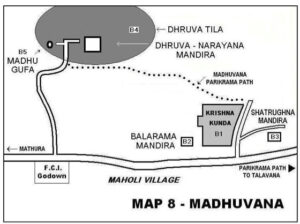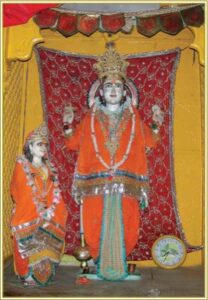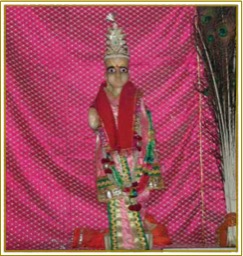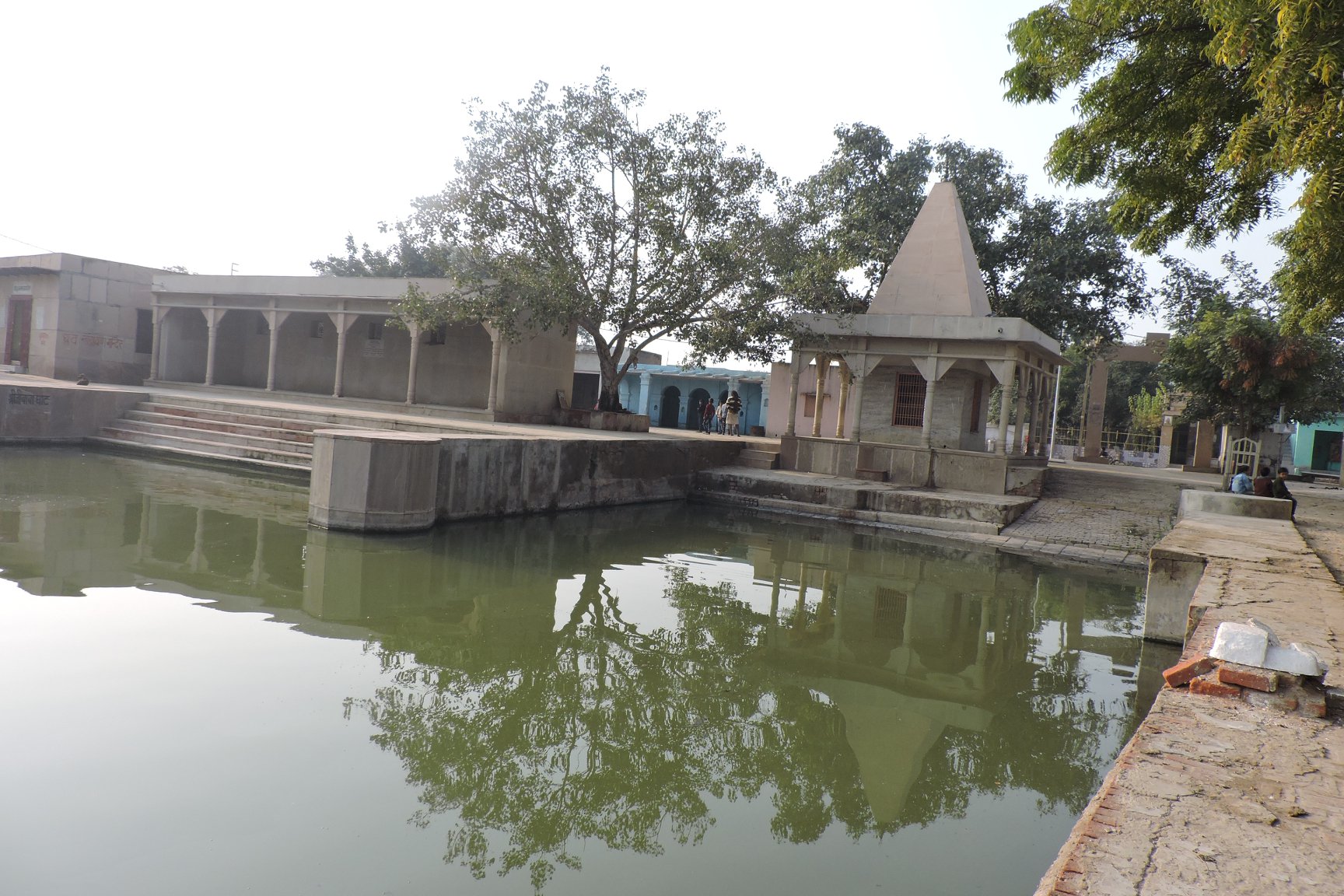Table of Contents
ToggleIntroduction
Location
Madhuvana lies south-west of Śrī Mathurā, about two-and-a-half miles from Bhūteśvara Mahādeva. It is one of Vraja’s twelve famous forests.
Lord’s Pastimes in all 4 Yugas
It is said that Madhuvana is the only sacred forest of Vrindavana where the Supreme Personality of Godhead performed transcendental pastimes in all the four yugas.
Satya-yuga, He appeared here as Lord Madhusudana and slew a great demon named Madhu who had taken control of the sacred forest. He also appeared in the same Satya-yuga as Lord Prishnigarbha to give His blessings to Dhruva Maharaja, who was performing severe austerities here in the Madhuvana forest.
Treta-yuga, He appeared here as Lord Shatrughna, the younger brother of Lord Ramacandra and slew the demon Lavanasura, the evil son of Madhudaitya.
Dvarapa-yuga, the Lord appeared here in His original form as Lord Shri Krishna and performed many wonderful pastimes with the cowherd girls and boys of Vraja.
Kali-yuga, Lord Chaitanya Mahaprabhu visited the sacred forest of Madhuvana during His Vraja Mandala Parikrama in the year 1515, and took His bath in the sacred Krishna-kunda.
How Madhuvana Forest Got Its Name
There are many references in the Vedic scriptures regarding Madhuvana.
- According to the Puranas the forest was so named when Lord Madhusudana, the incarnation of Lord Vishnu, slew the great demon Madhu daitya at this place.
- The word ‘madhu’ also means nectar, and because Lord Krishna engaged in many nectarine pastimes with the gopi’s here, the forest became known as Madhuvana. In this transcendental forest, Lord Madhusudana Shri Krishna, expertly captured the hearts of the gopi’s of Vraja and during the autumn season they enjoyed ecstatic rasa-lila pastimes on the banks of Krishna-kunda.
- Elsewhere it says that the forest got its name because large quantities of honey could be found here. The word ‘madhu’ also means honey, and this was the forest where Krishna and Balarama would regularly come with their friends to enjoy their madhupan-lila of drinking honey liquor. After feeling intoxicated from drinking honey, Krishna and Balarama would dance and sing in transcendental ecstasy along with their cowherd boyfriends.
Madhuvana’s Presiding Deity and the Mantra
Likewise, this forest became known as Madhuvana, because it is as endearing and sweet as the Supreme Lord Śrī Madhusūdana Himself.
Another name of Madhusūdana is Mādhava, because He is the beloved (dhava) of Śrīmatī Rādhikā, who is the foremost among all Lakṣmīs. This Śrī Mādhava is the presiding deity of this forest. While taking bath here or performing ācamana one should chant the following mantra – oṁ hrāṁ hrīṁ madhuvana-adhipataye mādhavāya namaḥ svāhā. Chanting this mantra renders one’s parikramā of this forest successful. The present name of Madhuvana is Maholī-grāma.

Dhruva-ṭīlā
On the eastern side of the village of Maholī is Dhruva-ṭīlā, where the deities of the child Dhruva and his worshipful four-armed Śrī Nārāyaṇa splendidly reside. Dhruva performed severe austerities here to attract the Supreme Lord, using the mantra Devarṣi Nārada had given him. Being pleased with his worship, the Lord appeared before Dhruva and awarded him absolute monarchy over the entire Earth for 36,000 years, followed by rulership of Dhruvaloka, an imperishable abode of Śrī Hari within this material universe.

Madhu and Lavaṇāsura’s tyranny
Demon Madhu’s Special Powers
In Tretā-yuga, the sages and other residents of Madhuvana were terrified by the atrocities committed by the Madhu demon, who, after performing severe austerities, had obtained a trident from Śaṅkarajī. As long as that trident remained in Madhu’s hands, no demigod, demon or human being could defeat him.
Killing of Demon Madhu
Although Madhu was a prince in the dynasty of the Sungod (sūrya-vaṁśa), he became cruel and devoid of good conduct due to bad association. His father rejected him and banished him from the kingdom. Madhu lived in Madhuvana, where he established a new kingdom in which he harassed the citizens.
According to the Puranas, Madhu married one of Ravana’s sisters and consequently formed a military alliance with him. The son born to Madhu from the womb of Ravan’s sister was called Lavanasura. In due course of time, Lord Vishnu appeared in the Madhuvana forest and slew the Madhu demon. Because of His slaying this demon, the Lord became celebrated by the name of ‘Madhusudana’, which means ‘Killer of the demon Madhu’.
The Rise of Lavanasura
Before his death, Madhu daitya gave that trident to his son, Lavaṇāsura. He told him that as long as this infallible trident remained in his hands no one would be able to kill him; rather, it would kill all his enemies. Trident in hand, Lavaṇāsura’s tyranny was even more cruel than his father’s.
It is also said that the great Surya-vamsa Emperor, Mandhata Maharaja, was killed in a fierce battle with the demon Lavanasura, who slew him with the very same infallible trishul.
Approached Lord Sri Ram
The great sages of Madhuvana and surrounding areas, distressed by his atrocities, went to Śrī Rāma in Ayodhyā and humbly prayed for protection. They informed Śrī Rāma of Lavaṇāsura’s might and of his infallible trident that rendered him invincible. They explained that killing him would not be possible as long as he had his trident at hand.
It was in the Treta-yuga when Lord Vishnu incarnated on earth in the form of Lord Ramacandra and His three brothers namely; Bharata, Lakshmana, and Shatrughna, whose mission was to destroy all the demons and rakshasas that were overburdening the world at that time. Lord Ramachandra and His three brothers represent the Chatur-vyuha, or four original forms of Lord Vishnu namely; Vasudeva, Sankarshana, Pradyumna, and Anirudha.

Śatrughna’s glorious victory
Śrī Varāha deity came to Madhuvan
In Ayodhyā, the Supreme Lord Śrī Rāmacandra coronated His younger brother Śatrughna as the king of Madhuvana. Śatrughna asked Lord Rāmacandra for the powerful deity of Śrī Varāha, that Rāmacandra had brought from Laṅkā, and which was brought in Lanka by Ravana from the heaven of Indra. Lord Ram happily agreed.
Killing of Lavaṇāsura
Lord Rama warned Shatrughna about Lavanasura’s infallible trishul weapon, saying that he should only challenge Lavanasura at the time when he went out hunting and did not carry the trishul.
Śatrughna then went with the sages to the āśrama of Vālmīki Ṛṣi and, after receiving his blessings, proceeded to Madhuvana. Bow and arrows in hand, Śatrughna arrived at the entrance of Lavaṇāsura’s cave at a time when Lavaṇāsura had gone hunting in the woods, and had left his trident behind in the cave. When the demon returned, carrying dead elephants, deer and other animals, Śatrughna challenged him to battle and a fierce fight ensued. In desperation, Lavaṇāsura tried to get hold of his trident, but Śrī Śatrughna, the highly valorous warrior and subduer of his enemies, was able to obstruct him, and with his sharp arrows he succeeded in cutting off his head.
Installation of Ādi-Varāhadeva
Śatrughna then re-established the deserted Madhupurī and installed Lord Varāhadeva there. This Ādi-varāhadeva is still present at the very same location in present day Mathurā, which lies within Madhuvana.
Lord Mādhava’s dear Madhu-kuṇḍa also lies in Madhuvana, and is now also called Kṛṣṇa-kuṇḍa. Nearby is the cave of Lavaṇāsura. A deity of Śrī Śatrughna resides in a temple near Kṛṣṇa-kuṇḍa.
Krishna-kunda (Madhu-kunda)
In the Bhakti-ratnakara, it is said that in the sacred forest of Madhuvana one can see a very beautiful lake which is full of sweet transparent water and fragrant blue lotus flowers, and anyone who bathes there will achieve the fulfillment of all their desires.
This sacred lake in Madhuvana forest is known as Krishna-kunda, or sometimes as Madhu-kunda and Madhuvana-kunda, and was the place where Krishna and Balarama performed many of Their transcendental pastimes. Krishna and Balarama often brought their cows to Madhuvana forest to graze on the sweet fresh grass that grew there. This pastime known as ‘ go-charana-lila’ which means ‘taking out the cows’ or sometimes as ‘ghoshta-vihara’ meaning ‘ambrosial pastimes in the pastures’ forms an integral part of Krishna and Balarama’s daily activities of taking the the cows to pasturing grounds around Vraja.
Once on a hot summer day, when Krishna was grazing His cows in Madhuvana forest, He created this kunda by pushing His flute into the ground so that the cows and cowherd boys could quench their thirst. This kunda then became famous as Krishna-kunda and Krishna and Balarama would enjoy many wonderful picnics along with their friends on the banks of this celebrated kunda.
Śrī Kṛṣṇa’s Pastimes in Madhuvana
Kṛṣṇa’s Communication with Cows
Towards the end of Dvāpara-yuga, Śrī Kṛṣṇa would take hundreds of thousands of cows out to graze, walking behind them and calling out their names: “Dhaulī! Dhūmrī! Kālindī! …” He would make sounds to instruct them, such as
- “Hiyo-hiyo! – Come, come!”,
- “Dhīrī-dhīrī! – Slowly, slowly!”
- “Tīrī-tīrī! – Come to the river-bank to drink!”
- “Nīrī-nīrī! – drink!”
The Shower of Sweet Madhu of Prema
As He walked with Dāū Bhaiyā (Baladeva), Kṛṣṇa played His sweet flute, and laughed and joked, placing His hands on the shoulders of the sakhās. As the boys herded the cows, delightful uproars would break out amongst them. In this way, all of Madhuvana was showered with the sweet nectar (madhu) of prema, which Śrī Kṛṣṇa and Śrī Balarāma relished while grazing the cows.
Reciprocation with Gopis through Eyes
While walking along like this, sometimes Kṛṣṇa’s thirsty eyes would look with sidelong glances at the gopīs who were hiding within the kuñjas or on the balconies or windows of their palaces. The beautiful young ladies of Vraja worshipped Kṛṣṇa with their loving sidelong glances as He returned from the forest. Kṛṣṇa would show that He accepted their worship by the movement of His eyes.
To the young ladies of Vraja, even a second in separation from Kṛṣṇa would feel like millions of millenniums, and a millennium in His company would seem like a fraction of a second. Kṛṣṇa’s cow herding pastimes in Madhuvana are as sweet as honey (madhu) and beyond description.
Mahaprabhu Visited Madhuvan
In Kali-yuga, about five hundred fifty years ago, Śrī Caitanya Mahāprabhu visited Vraja and came to Madhuvana, where a momentary vision (sphūrti) of Śrī Kṛṣṇa’s pastimes overwhelmed Him with ecstasy. Each year, many groups of pilgrims stop here to rest.
The Black Deity of Dāūjī
In Madhuvana, Dāūjī and the sakhās would dance as they relished the sweet nectar of this forest. This is well known. Today, one can also take darśana of the black deity of Dāūjī here. There is a deep secret behind the black colour of this deity.
Secret of Dāūjīs colour
After leaving Vṛndāvana and Mathurā, Śrī Kṛṣṇa and Baladeva resided in Dvārakā with Their relatives. When Baladeva heard about the restlessness and lamentation of all of Vraja in separation from Śrī Kṛṣṇa, He wanted to take Kṛṣṇa back there, yet because this was somehow delayed, Baladeva went there alone. He did His best to console everyone, but when He saw the extent of their state of separation from Kṛṣṇa, He also felt intense separation from Him. Meditating upon Śyāma and His pastimes in Vraja, Baladeva began to relish śyāma-rasa (or mādhura-rasa), and Himself took on a śyāma (blackish-blue) complexion. This śyāma-rasa is the only honey that is truly sweet and it is eternally relished by Baladeva, who thus remains perpetually immersed in the ecstasy of kṛṣṇa-prema.


